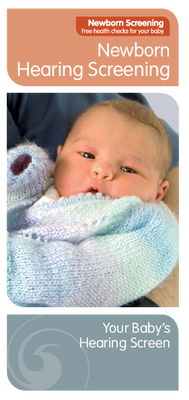Newborn Hearing Screening: Your Baby's Hearing Screen - English - HE2429

Explaining the benefits of newborn hearing screening and the procedure used.
The full resource:
Newborn Screening
Free health checks for your baby
All babies are checked at birth to see that all is well. Some of your baby’s health checks are called ‘screening’.
Newborn hearing screening – why does my baby need it?
You will be offered newborn hearing screening to check whether your baby can hear well. The screen is designed to pick up moderate to profound hearing loss. It will not necessarily pick up a mild hearing loss. If babies can’t hear, it’s hard for them to understand and communicate with you. If your baby does have a hearing loss, finding it early is good for their language, learning and social development.
What is newborn hearing screening?
To screen your baby’s hearing, an ear cushion will be placed over your baby’s ear and soft clicking sounds played. Special sensors are placed on your baby’s head, and the response from your baby’s hearing nerve is picked up by these sensors. This is called an automated auditory brainstem response or an aABR screen.
When and where will the newborn hearing screening be done?
Screening is usually done before you and your baby go home from the hospital. If your baby is not born in a hospital or is not screened before you go home, newborn hearing screening will be offered at your local health clinic or hospital outpatients’ clinic. It’s best to go earlier than the appointment time so you can feed and settle your baby to sleep beforehand.
Will it hurt my baby?
Newborn hearing screening does not hurt or harm your baby and you can be with them during screening. It is simple and safe – most babies sleep through it. A screen may take 15–20 minutes and is best done when your baby is settled or sleeping.
What happens after the newborn hearing screening?
You will be told the results straight away.
Some babies need another screen because the earlier screening did not show a strong enough response in one or both ears.
This may be because:
-
your baby was unsettled
-
there was too much noise in the testing room
-
there was fluid in your baby’s middle ear
-
your baby may have a hearing loss
-
carry out research approved by a human ethics committee.
If this happens with your baby’s hearing screen, you will be offered a repeat screen, either before leaving the hospital or as an outpatient appointment.
What if a repeat screen does not give a clear result?
This may not mean your baby has a hearing loss. You will be referred to a hearing specialist (audiologist) who will do more tests and give further advice.
Your rights
The code of Health and Disability Services Consumers’ Rights protects your rights. For more information go to the Health and Disability Commissioner's website.
The Health Information Privacy Code protects your personal details and gives you rights to access information about yourself and correct it. For more information go to the Privacy Commissioner's website.
What information is collected and how is it used?
As part of this screening, information required by the programme is collected by your local hospital and Health New Zealand | Te Whatu Ora about you and your baby.
The information collected includes names, baby’s date of birth, contact details, ethnicity, doctor and other carers, hearing screening information and results. It is used to:
-
check that babies have been offered screening
-
provide screening results to the family doctor and other maternity and health carers
-
monitor, evaluate and report on the screening programme.
This information is held on a nationwide data system and may be shared with other child health information programmes and Well Child Tamariki Ora Services including the B4 School Check.
If your baby is found to have a hearing loss, this information is shared with the Ministry of Education to ensure early intervention services are offered to you and your child. This information is also provided to the Deafness Notification Database.
No published reports identify you or your baby in any way.
Further information
If you have further questions please let your lead maternity carer or hearing screener know.
More information on shared electronic records can be found at Data protection and privacy – Health New Zealand | Te Whatu Ora
The Well Child Tamariki Ora checks include questions for parents about their baby’s hearing, speech and language progress. If you have concerns about the way your child listens or responds, please discuss this with your Well Child nurse, early childhood teacher or your doctor.
Health New Zealand | Te Whatu Ora and the Ministry of Education together oversee and monitor the Universal Newborn Hearing Screening and Early Intervention Programme. It was established to ensure better outcomes for babies with hearing loss and their families and whānau.
For further information about newborn hearing screening, visit Universal hearing screening for newborns